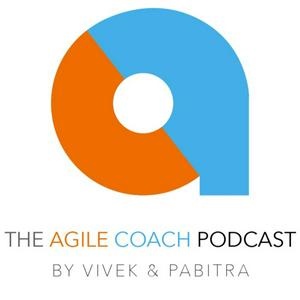The Product Owner Unlocked: Candid Lessons from Agile Leaders
In this special episode of The Agile Coach Podcast, leading voices in product ownership and agile transformation: Joe Justice, Richard Seroter, Mark Shead, Sheetal Rajpal, and Jeff Bubolz, share their hard-won lessons from building and scaling products at organizations like Tesla, Google, Amazon, LendingTree, and more. Their experiences span hardware and software, startups and global enterprises, and regulated industries, offering a comprehensive look at what it truly means to be an effective product owner today.Key Product Ownership Insights:Joe Justice (Agile Business Institute, ex-Tesla, WikiSpeed)Agility as Innovation Engine: Agility is about making change cheaper, faster, and less emotionally taxing. At Tesla, the “Justice Board” (a cascading chain of KPIs) aligns everyone to the mission, empowering any contributor to propose measurable experiments that advance the master plan12.Embedded Leadership: Leaders, including product owners, should be deeply involved with teams—removing barriers, modeling commitment, and sharing ownership of outcomes.Mob Programming for Ownership: High-performing teams share business context and technical knowledge through practices like mob programming, making the product owner an integral, accessible part of the team rather than a distant decision-maker.Richard Seroter (Google Cloud)The PO as Value Translator: The product owner is not a distant spec-writer but an “intense stakeholder”—embedded with engineers, translating customer needs into actionable stories, and prioritizing with courage and clarity.Continuous Feedback & Data-Driven Decisions: Modern product teams thrive on small batch delivery and rapid feedback. Product owners must be adept at interpreting telemetry and customer data to inform priorities and validate outcomes quickly.Role Fluidity: In some organizations, the distinction between product owner and product manager blurs, but the core remains: maximizing value by being close to both customers and the delivery team, reducing friction between vision and execution.Mark Shead (Xeric Corporation)Principles Over Labels: True agility is about living agile values and principles, not just adopting practices or titles. Teams and product owners must align decisions to core agile principles, not just mimic successful teams elsewhere.Embedded Product Owners: The most effective product owners are those who use the product themselves and are continuously available to the team—answering questions, clarifying needs, and making real-time decisions.Backlog as a Living Tool: Product owners must ruthlessly prioritize, avoid bloated backlogs, and focus on delivering customer value, not just accumulating requests or technical debt.Sheetal Rajpal (Head of Product; ex-Amazon, LendingTree)Customer-Centricity & Data: Product owners must “walk in the customer’s shoes,” using data and direct observation to continuously improve user experience and product outcomes.Strategic Product Thinking: At Amazon, product leaders own both strategy and execution—articulating a clear vision, defining decision-making tenets, and using the “working backwards” process to align teams around customer-centric outcomes.Building Data-Driven Products: Making products data-driven requires clarity on objectives, a deep understanding of data quality, and explicit constraints—especially when leveraging AI or machine learning.Jeff Bubolz (Organizational Agility Advisor, Co-Founder)Focus & Trade-Offs: The essence of product ownership is making tough trade-offs and saying “no” as often as “yes.” A focused, strategic backlog is more valuable than a frantic, overloaded one16.Scaling Without Overhead: When scaling, avoid creating layers of product owners and managers that add friction. Instead, form autonomous, cross-functional teams aligned to real products and outcomes.The Three Vs: Product owners should set Vision, maximize Value, and Validate outcomes—prioritizing learning and continuous improvement over rigid plans.Practical Advice for Product OwnersBe Embedded: The best product owners are part of the team’s daily life, not just attending ceremonies or writing requirements. They are accessible, knowledgeable, and invested in both the product and the people.Prioritize Ruthlessly: Every “yes” to a backlog item is a “no” to something else. Product owners must be strategic, focusing on what delivers the most value and aligns with the product vision.Align on Principles: Start with shared understanding of agile principles and values, then select practices that support those principles in your context.Use Data Effectively: Leverage real-time data and customer feedback to inform decisions, validate outcomes, and iterate quickly.Enable Team Autonomy: Empower teams to solve problems, avoid micromanagement, and foster a culture of continuous learning and experimentation.Strategic Scaling: When scaling, ensure teams remain cross-functional and outcome-oriented, not siloed by function or weighed down by management layers.Quotes from the Episode“Agility is making change cheaper in time and money, and also in emotional willpower—making it less draining or even more fun. That is the game.” — Joe Justice“A product owner is not an arm’s length participant. You should be pairing with engineers, getting rapid feedback, and translating customer needs into value.” — Richard Seroter“The most effective product owners I’ve ever worked with were embedded with the team, using the software daily, and always available to help.”— Mark Shead“At Amazon, PMs own both strategy and execution—articulating vision, setting decision-making tenets, and working backwards from the customer.” — Sheetal Rajpal“The essence of product ownership is making tough trade-offs and saying no as often as yes. Focused, strategic backlogs unlock value.” — Jeff Bubolz
